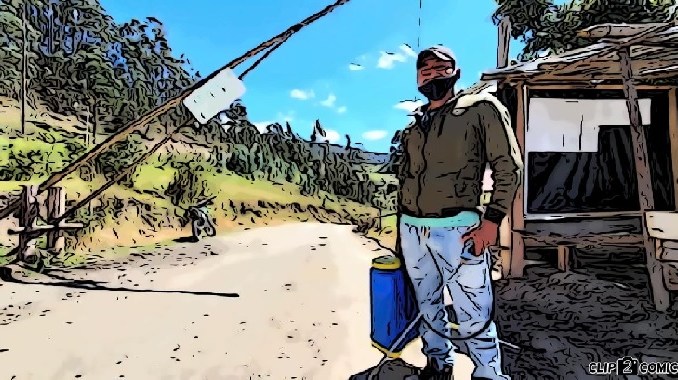
Some indigenous communities resolved to confine themselves to avoid contagion.
In order to prevent the spread of the coronavirus, some indigenous communities in Loja, Sucumbíos, Esmeraldas, Carchi, Imbabura and Tungurahua decided to confine themselves.
In 13 communities in Saraguro (Loja), income is controlled, agro-ecological fairs were created to feed and biosecurity measures are applied to avoid contracting the disease.
The decision was made in assemblies by community leaders and until July 2 they did not register infections. They meet weekly to assess the situation.
In Kiskinchir, located 2 kilometers from the center of Saraguro, where 155 families live, the first decision was to place a long wooden pole crossed on the main road to control entry, the rest of the roads were blocked.
At this control point, motorcycles, vehicles and shoes of those who left due to a situation are fumigated – with quaternary ammonium donated by the Municipality. In the populated center there is little movement of people. Women and men remain in their gardens caring for and planting broccoli, lettuce, carrots, strawberries, potatoes, among other products.
Before the emergency, the production of this area supplied the markets of Saraguro, Loja and the canton Yantzaza (Zamora Chinchipe).
Rodrigo Medina, president of the Cabildo, said that for fear of contagion they resolved to confine themselves and survive in community.
Lagunas, Tuncarta, Tambopamba, Yukucapak are other communities that also confined themselves.
Similar strategies were adopted by the Awá indigenous people of the 27 populated centers of Esmeraldas, Carchi, Imbabura and Sucumbíos.
Jairo Cantincús, leader of the Federation of Awá Centers of Ecuador (FCAE), said that the restrictions were agreed with the leaders on March 16.
For them, the long distances between various rural towns and urban centers are a natural barrier to prevent the virus from affecting 6,000 members.
Meanwhile, the Federation of Indigenous and Peasant of Imbabura -which brings together the Otavalo, Kayambi, Natabuela and Karanki- peoples- recommended that the leaders maintain a single path to verify the passage of people and activate biosecurity measures, such as fumigation.
In Tungurahua, the increase in cases due to Covid-19 led the 17 communities of the Salasaka people to opt for voluntary isolation for two weeks.
The 12,000 inhabitants of this parish in the Pelileo canton stopped carrying out their trade and craft activities to avoid further infections.
Antonia Quinatoa, president of the Parish Board, expressed that the measure adopted was to prevent more infections. At the moment in that area there are 6 positive cases and 10 with suspected coronavirus.
Source: El Comercio, social networks

Be the first to comment